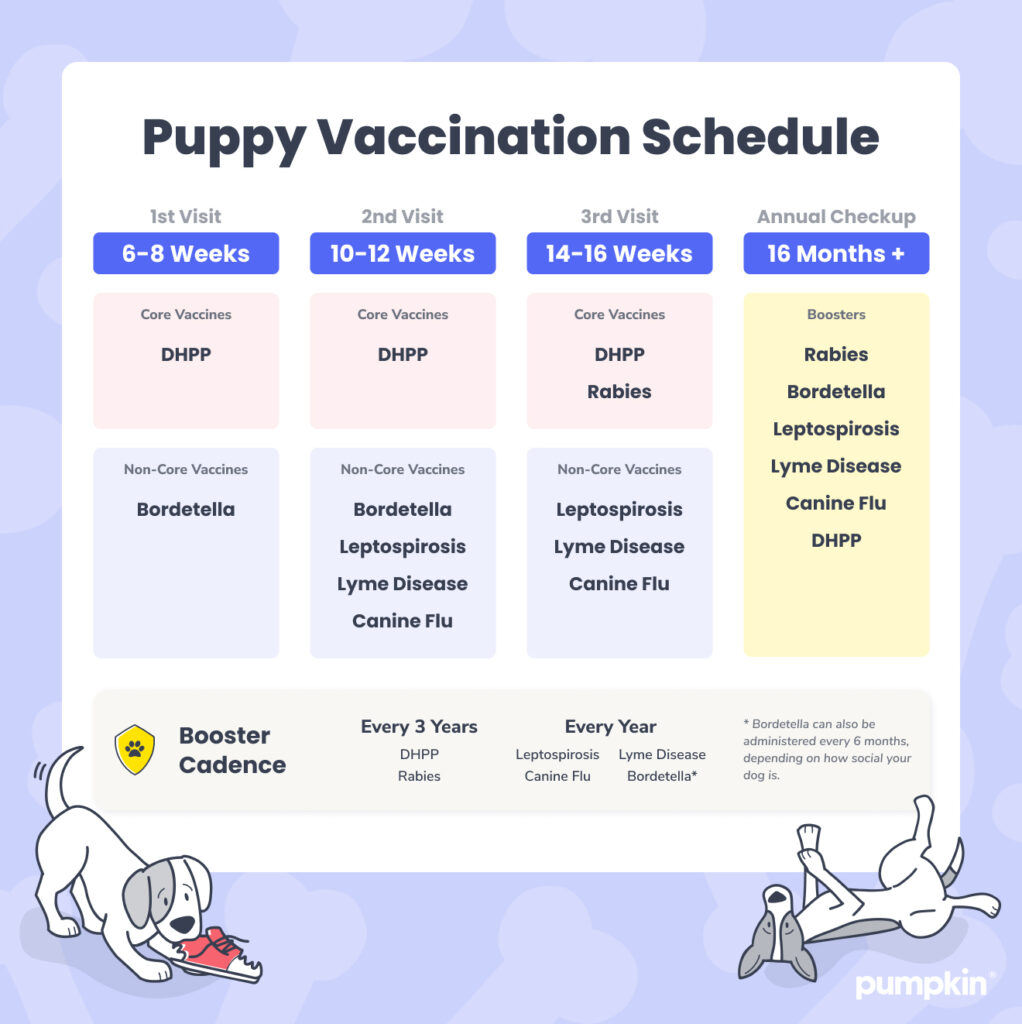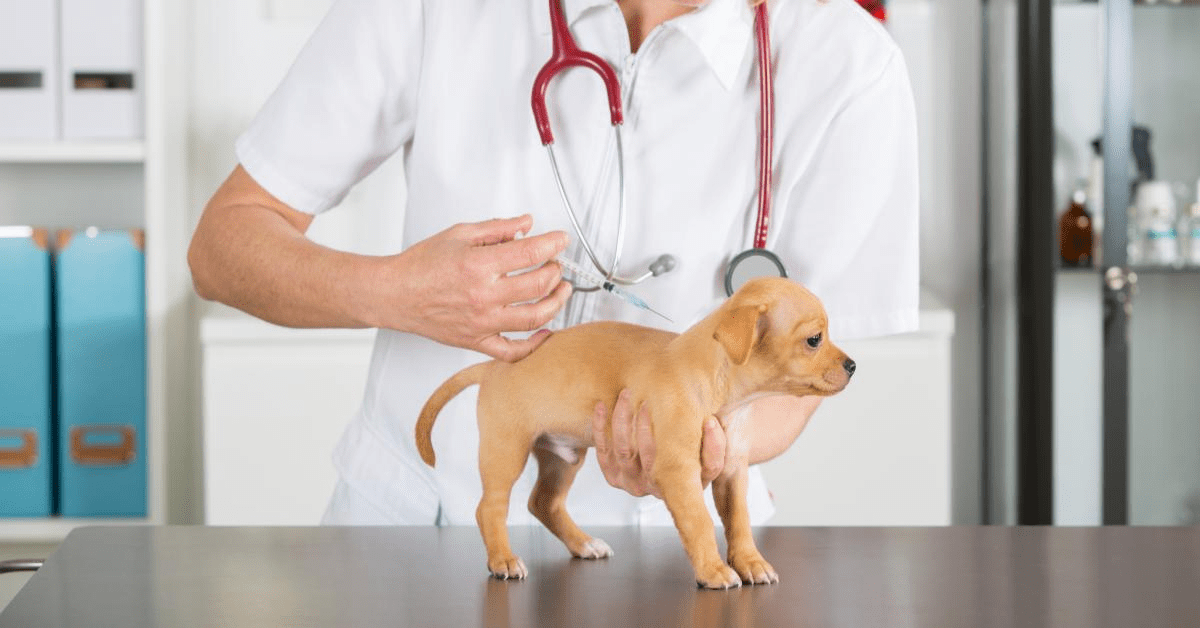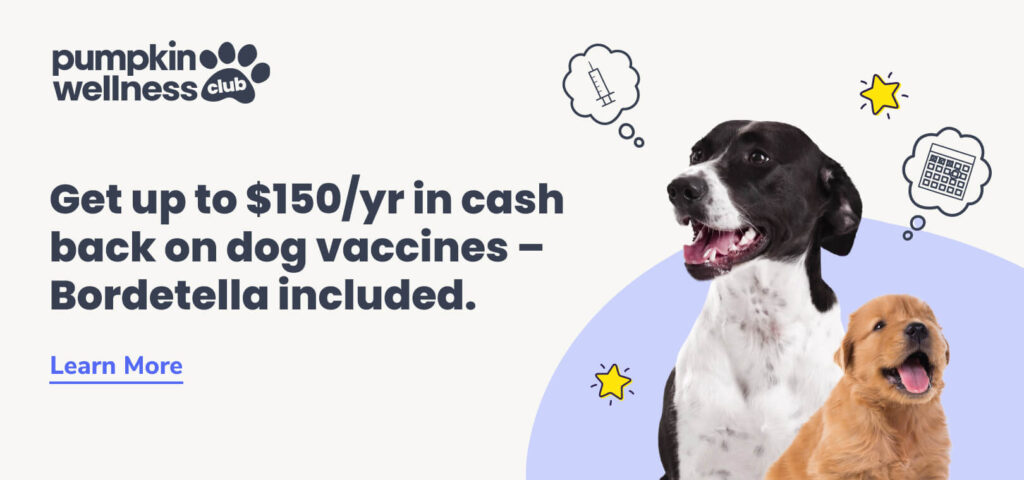Key points
- Getting your dog vaccinated for kennel cough can help keep them healthy if they are exposed to bordetella bacteria.
- While bordetella is not a core puppy vaccine, it’s recommended or required at most boarding facilities and training schools.
- Joining the Pumpkin Wellness Club* gets you cash for vaccinations such as bordetella and other vet-recommended preventive care services (trust us, those vaccinations and boosters really can add up over your pet’s lifetime).
Does that hacking cough from the dog park sound familiar? Maybe your own pup has joined the chorus, sounding like they swallowed a kazoo? Kennel cough could be the culprit. This contagious respiratory illness causes a hacking cough in dogs and spreads like wildfire. But fear not, pet parents: You can protect your pup against kennel cough with the bordetella vaccine.
Following the recommended puppy vaccine schedule helps set up your dog for a happy, healthy life. Some shots are considered core vaccines for dogs by the American Animal Hospital Association — namely the rabies vaccine, which is required by law in most states, and the 5-in-1 DHPP vaccine.
The bordetella vaccine is on a separate list of lifestyle-dependent vaccines, or non-core vaccines, which are recommended based on factors such as whether you board your dog, where you live, and your dog’s risk of contracting the disease. This leads some pet parents to question whether or not their dog needs the bordetella vaccine.
The short answer: If your dog socializes with other pets frequently (and that includes cats) you should make sure they’re vaccinated against bordetella. If you’re unsure, consult with your local veterinarian — they will be able to tell you if your dog is at risk.
Keep reading to learn everything you need to know about the bordetella vaccine for dogs, from boosters to potential side effects.
Is bordetella the same thing as kennel cough?
Kennel cough, also known as canine infectious tracheobronchitis, is a respiratory infection that can make your dog sound like they’re having a coughing fit. It’s caused by a combination of viruses and bacteria — and bordetella is the most common culprit.
The bordetella vaccine acts as a shield for your dog, specifically protecting them from a bacterium called Bordetella bronchiseptica. The vaccine introduces a weakened or inactive form of the bordetella bacteria to your dog’s body, so their immune system can recognize and fight off a bordetella infection if they ever encounter the bacteria.
While kennel cough is rarely life-threatening for healthy adult dogs, it can be quite uncomfortable and lead to secondary infections. Plus, that persistent cough can put a damper on your pup’s zoomies and long walks.
How does kennel cough spread?
Think about the last time you got the common cold. Was it from sitting across from a sick coworker at the office? From drinking out of a shared glass? The illness is so contagious, it can be hard to pinpoint exactly where you came into contact with contaminants.
Kennel cough spreads in a similarly rapid fashion. Dogs can become infected by inhaling sneeze or cough droplets from infected dogs. Bordetella bacteria can also live on objects such as toys or water bowls for short periods of time.
Dogs infected with bordetella develop a dry, hacking cough — often with a distinctive honking sound — that can persist for several weeks. This cough, as well as other symptoms like panting and sneezing, helps to spread the bacteria to new targets. So if your dog does contract kennel cough, make sure to keep them away from other dogs while they’re symptomatic.
Does my dog need the bordetella vaccine?
Not all dogs need the bordetella vaccine. But if your dog frequents doggy daycare, boarding facilities, dog parks, or training classes, they have a higher risk of encountering bordetella.
Many boarding facilities and daycares require proof of bordetella vaccination and a recent booster, so make sure you check with the facility well before your trip. Dog shows also may require proof of bordetella vaccination before your pup enters the ring. It is best if you have your dog vaccinated at least two weeks before they are boarded, go to daycare, or go to a dog show.
How much does the bordetella vaccine cost?
The bordetella vaccine typically costs around $30, give or take a few dollars depending on your location. That’s not a bad price for protecting your dog from a common and highly contagious illness, but it can add up if your pup needs their core vaccines, too.
If you were to add up the cost for bordetella, rabies, and DHPP vaccines (which protect your dog against distemper, hepatitis, adenovirus, parainfluenza, and parvovirus), your vet bill could be $100 or more. Plus, you’ll have to pay for boosters every one to three years to keep your dog’s defenses strong.
Most pet insurance plans that cover accidents and illnesses do not cover the cost of routine vet visits or vaccinations, but that doesn’t mean these services are any less important for your pet’s health (or less costly for you). The good news is, programs like the Pumpkin Wellness Club are designed to help pet parents save money on vet-recommended preventive care, including routine vaccinations.
With Pumpkin Wellness Club, you can get up to $150 a year for your pet’s vaccinations, depending on your membership level. That’s not all — members can save up to $360 per year on annual wellness visits and more routine care, plus other perks like discounts on top pet brands.
Is there a difference between the bordetella injection and nasal spray?
The bordetella vaccine usually administered in one of two forms:
Intranasal: This option delivers the vaccine through a mist up your dog’s nose. Immunity sets in quickly and protects dogs fast with this option, making it a favorite of many vets. But, your dog will need a booster dose every 6 to 12 months.
Injection: This method involves two injections under the skin administered two to four weeks apart. Immunity mounts more slowly with this option, but injectable bordetella only has to be administered once every one to three years, depending on lifestyle.
Another bonus of the intranasal bordetella vaccine is that it’s often combined with other necessary vaccinations, so you can protect your dog from multiple illnesses with just one vaccine.
There’s also an oral form of the bordetella vaccine, which is less widely used. Studies have shown it is less effective than the other available methods, but it still provides some level of protection and is better than skipping vaccination entirely.
When should my dog get the bordetella vaccine?
Puppies can get the intranasal bordetella vaccine at three weeks of age or older. Most vets will administer intranasal bordetella when a new patient is between eight to ten weeks of age. The injectable vaccine is typically administered around 10 weeks of age.

After your dog’s initial dose, your vet will likely recommend that your dog receive a booster shot six to 12 months later, depending on their lifestyle and the type of vaccine. Some doggy daycares or boarding facilities may require proof of an additional booster dose every year, while dogs that enjoy their alone time can wait longer between boosters.
What are the potential side effects of the Bordetella vaccine?
Like any medication or procedure, the bordetella vaccine might cause some mild, temporary side effects in your dog, such as:
- Sniffles or sneezing (usually after the intranasal vaccine)
- Mild coughing
- Temporary loss of appetite or lethargy
- Pain or swelling at the injection site (if the injectable vaccine is used)
Some dogs may also experience a low-grade fever with any vaccination. These side effects are usually nothing to worry about and resolve on their own. However, if mild vaccine reaction symptoms last longer than 3 days, or if your dog experiences a severe reaction, consult your vet immediately.
What should I do if my dog gets kennel cough?
Even with the bordetella vaccine, it’s possible for your dog to experience a mild case of kennel cough. However, the severity and duration of symptoms will likely be significantly reduced. Here’s what to do if your dog shows signs of kennel cough after vaccination:
- Monitor Symptoms: Keep an eye on your dog’s cough, appetite, and energy levels.
- Contact Your Veterinarian: If symptoms persist or worsen, consult your veterinarian for guidance.
- Quarantine: Keep your dog home and away from other dogs. If you have other pets at home, make sure to wash your hands frequently to avoid getting them sick.
Vaccination is a powerful tool, but it’s not an invisible forcefield. Even if your dog is up to date on their bordetella boosters, make sure to maintain good hygiene by washing your hands before and after handling your dog, and keep your pup away from any coughing canines.
DISCLOSURE





